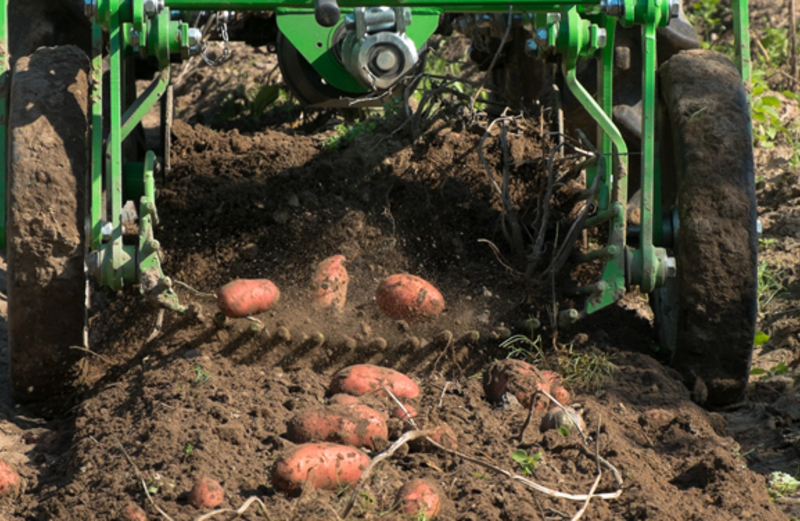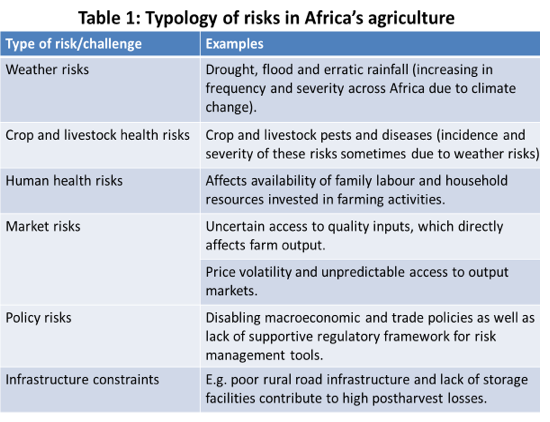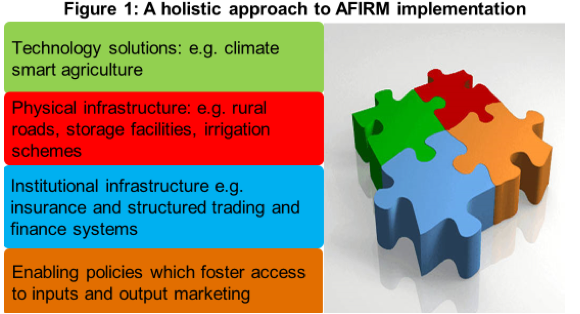Managing Agriculture and Food Insecurity Risks

Managing agriculture and food insecurity risks is critical to ensuring inclusive growth and greater resilience for Africa’s economic development and transformation. The objective of the Agriculture and Food Insecurity Risk Management (AFIRM) project in AUDA-NEPAD is to empower producers, especially smallholder farmers (SHFs), to better manage agricultural and food insecurity risks. This objectiveis well-aligned to the overarching goals of the Malabo Declaration on Accelerated Agricultural Growth and Transformation for Shared Prosperity and Improved Livelihoods,adopted by African Heads of State and Government at the 23rdAfrican Union (AU) Summit in 2014.
A long term-structural shift in approach from crisis management to effective risk management, as anticipated under AFIRM, will contribute to reducing food insecurity and building foundations for rural transformation in Africa. AFIRM focuses on investments in strategic rural physical infrastructure as well as capacity building to reduce risk exposure through resilience building and adaptation of smallholder farmers’ livelihoods. It fosters risk transfer, mitigation and sharing through various tools including (but not limited to) insurance mechanisms, contract farming, productive safety nets and access to finance. AFIRM also enhances risk coping using available and complementary assets as well as behavioural change.
 Risks which are prevalent in agricultural value chains, including at farm level, are hampering efforts to boost output and productivity in the sector. As illustrated in Table 1, there are natural risks e.g. weather risks as well as crop/livestock pests and diseases. Also prevalent are market and policy risks.
Risks which are prevalent in agricultural value chains, including at farm level, are hampering efforts to boost output and productivity in the sector. As illustrated in Table 1, there are natural risks e.g. weather risks as well as crop/livestock pests and diseases. Also prevalent are market and policy risks.
Infrastructure constraints are often known and can therefore not be described as risks but they tend to accentuate the negative effects of risks, leading to high economic losses.
A challenge for policymakers is how to respond to agricultural and food insecurity risks in a way which is appropriate, sustainable and entails minimum trade-offs in terms of other development goals, including those captured in the Malabo Commitments. The AFIRM project adopts a holistic approach, which simultaneously enhances resilience among producers, cushions consumers against supply shocks and sustains an incentive framework which can catalyse enduring transformation of the agriculture sector and food systems.
Recommendations for anchoring Agriculture and Food Insecurity Risk Management in National Development Plans
 The holistic approach in promoting AFIRM, is illustrated in Figure 1. Smallholder farmers will benefit from mutually-reinforcing interventions, rather than actions aimed at mitigating specific risks in isolation. For instance, the technology solutions (e.g. climate smart agriculture) can sustain output growth in the face of climate variability, only if storage facilities are made available and structured trading mechanisms are set-up. Hence, gains made by smallholder farmers can be further optimised if there are complementary investments in physical and institutional infrastructure which improve output markets accessible to them. The design of the AFIRM programme and its fundamental implementation strategy are consistent with this holistic approach, stressing synergies between the different AFIRM components which are promoted in line with national priorities.
The holistic approach in promoting AFIRM, is illustrated in Figure 1. Smallholder farmers will benefit from mutually-reinforcing interventions, rather than actions aimed at mitigating specific risks in isolation. For instance, the technology solutions (e.g. climate smart agriculture) can sustain output growth in the face of climate variability, only if storage facilities are made available and structured trading mechanisms are set-up. Hence, gains made by smallholder farmers can be further optimised if there are complementary investments in physical and institutional infrastructure which improve output markets accessible to them. The design of the AFIRM programme and its fundamental implementation strategy are consistent with this holistic approach, stressing synergies between the different AFIRM components which are promoted in line with national priorities.
Strategic infrastructure investment under AFIRM in synergy with actions to promote a combination of risk management tools and policy instruments can directly contribute to achieving the following Malabo Commitments:
- Commitment 6: Strengthening resilience of rural communities by ensuring food availability through increased output and better storage (postharvest handling);
- Commitment 3:By complementing the above with productive safety nets for vulnerable populations and strengthening early warning systems, contributing to ending hunger in Africa by 2025;
- Commitment 5:Boosting intra-African trade in agricultural commodities and services;
- Commitment 4:Halving poverty through inclusive agricultural growth and transformation as household incomes increase, resulting from AFIRM interventions;
- Commitment 2:Driving sustainable increase in the supply of inclusive finance in agricultural value chains by promoting tools which reduce lending risks.
Technical and advisory support is brought to Governments in designing risk management policies and strategies, and more crucially, in translating such policies into specific action plans to strengthen and/or broaden identified AFIRM interventions. Policy focus needs to shift from short-term actions to address the effects of risks through long term holistic AFIRM programs. Such programs incorporate, among others, a bottom-up approach in their design and implementation, ensuring the involvement of local government structures and farmers’ organisations. Gender mainstreaming needs to be stressed in order to avoid the unintended marginalisation of women, as risk reduction and consequent increased access to resources catalyses commercialisation of agricultural value chains. Supply of both public and private AFIRM interventions should be promoted, complemented in both cases by enabling policy and regulatory actions initiated by Governments.
